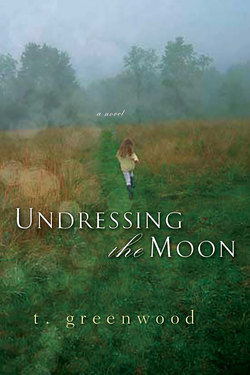Читать книгу Undressing The Moon - T. Greenwood - Страница 17
На сайте Литреса книга снята с продажи.
ОглавлениеHope. This is my mother’s true and cruel legacy. When I was a child, I hoped she would come back. At thirty, I only hope that I will live. And live and live. This is my inheritance. My endowment, my trust. A handful of sand and broken glass.
When the doctors confirmed what I already knew, I hoped. I listened to their statistics in their cold waiting rooms as my nipples hardened against the rough blue paper dresses. I looked at the charts and diagrams and grim smiles and hoped. We scheduled the surgery and, later, my treatments. I bought beautiful scarves, drank liquid vegetables and fruits. I vomited and imagined cancer nothing more than stomach bile, acidic and expendable. And I hoped.
Even though I’ve stopped going to the hospital for treatments, Becca still brings home articles she prints off the Internet about experimental procedures, about women who have prevailed despite the illness that has battered them. Each story of success and the accompanying picture of the face that belongs to the body inspires a strange desire. Hope is really just desire disguised, just desperation, aching, dressed up like a prayer. But while hope is elusive, desire is something I can understand. I have wanted and wanted and wanted. I can’t even count all of the things I have wanted. To have. To do. To be. It’s like the familiar longing for a lover; it resides in my heart and in my body. I want to be well again.
Hope has become the same as sunlight. Some days it is warm on my shoulders and back. Some days it’s just gone. It doesn’t worry me, it’s just missing. I know you can no easier lose hope than you can lose sunlight. There is never any doubt hope will return. But I am waiting. There have been too many cloudy days lately.
I’ve started misplacing things and finding them later. Small surprises. Yesterday, I found a pair of scissors in the refrigerator. This morning I found a pincushion under my pillow. It’s making work difficult. I work at home, sewing wedding dresses and prom dresses, making costumes and mending holes. At least the sewing machine is too heavy for me to absentmindedly pick up and move.
I am making a wedding dress for a twenty-nine-year-old widow. Her first husband died of meningitis three weeks after their wedding. It came on suddenly: a fever, then blindness, and then she was alone in a brand-new house with a pile of wedding gifts waiting to be unwrapped. I didn’t ask, but she offered this story to me, almost as if she were sorry. As if she had to explain falling in love again.
She wants a dress that makes her look like Juliet. I went to Boston and bought ten yards of silk chiffon, embroidered with golden thread. When I showed her the bolt, she unrolled it on my living room floor, careful to blow away the dust bunnies before she smoothed her hand across the fabric. And after she had rolled it back up, she held the fabric to her face and started to cry.
“Don’t think I’m terrible,” she said softly.
“I don’t,” I said.
When someone dies, there always has to be someone left behind. She doesn’t know that I am studying her, that she is teaching me the gestures of survivors.
I stopped working when I first got sick, entertaining romantic notions of dying, mostly that it would be my primary obligation. I thought the world as I knew it would stop for me now that I was sick. But dying isn’t the way I imagined it. Credit card companies still want their minimum payments; landlords still want their rent. So my hiatus was short-lived, and I am glad now for the distraction that sewing provides. But even when my hands are busy, my mind is still free. It wanders farther than it used to. I suppose that’s why today I found my tape measure wound around Bog’s dog dish and the iron propping up a row of books on my mantel.
Sometimes I worry about the other things I stand to lose. My faith, my temper, my way. I have lost weight. My hair. Great portions of my breasts. But unlike my scissors and pins, they don’t seem to be coming back. I know that other things will go unless I get better, there is still plenty to lose.
He lost his child. Felicity. He was reluctant to tell me how. It wasn’t as easy as describing the peace in his wife’s face or the way the lights reflected off her seatbelt buckle and the broken windshield, blinding him. Felicity, happiness. I still wonder if he was just trying to tell me that after his wife was dead, he lost his happiness.
Becca, who has reappeared after all these years (an auburn-haired angel from some other time), assures me that I have held on to the most important things. Dignity. My sense of humor. And, most important, my voice. She knows, as I know, because she was there when I found it, that if I were ever to lose it again, I would have to let go. That losing my voice would mean losing hope.
